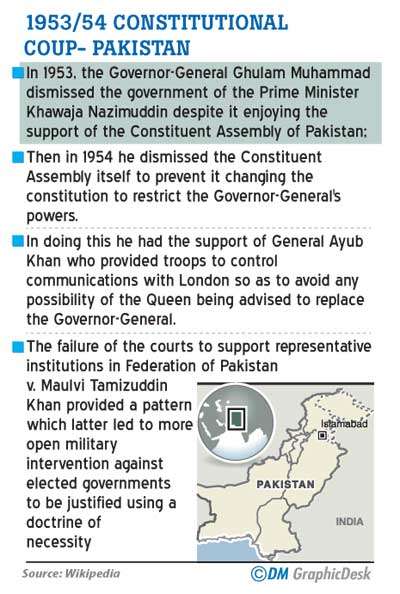Reply To:
Name - Reply Comment
Last Updated : 2024-04-26 02:12:00
 ri Lanka’s constitutional coup or crisis, as the case may be, has an eerie similarity to a constitutional coup that took place in Pakistan in 1953 – and the evolution of that country’s judiciary – from servility to supremacy – stresses the importance of judicial activism.
ri Lanka’s constitutional coup or crisis, as the case may be, has an eerie similarity to a constitutional coup that took place in Pakistan in 1953 – and the evolution of that country’s judiciary – from servility to supremacy – stresses the importance of judicial activism.
The Pakistan coup, that country’s first in a series of coups, teaches us an important lesson: It tells us that generations to come will suffer if any one of the government’s arms is to make a mistake, when called upon to play their constitutional role, particularly at a time when the nation’s existence as a democratic entity is threatened.
Sixty-five years after that constitutional coup and a judicial ruling favouring it, Pakistan is still struggling to establish itself as a fully-fledged democratic state – with the biggest threat to democracy being the military hanging on to that appalling judicial decision.
If only the Federal Court that was called upon to judge the legalities of the 1953 coup had sided with justice and understood how important democracy was to the nascent state, Pakistan would have been spared of its many military coups that have only contributed negatively to the country’s stability and socio-economic development.

First, the details of the doomful coup which overthrew the government of Prime Minister Khawaja Nazimuddin, a prominent figure in the Pakistan movement: The new nation was struggling to stand on its feet as an independent state. Muhammad Ali Jinnah had died. The country had already faced its first war with India. Its first Prime Minister Liaquat Ali Khan had been assassinated. The country’s stability was being shaken by never-ending protests and demonstrations. Religious tension was high with Sunni groups urging the government to declare that the Qadianis or the Ahmadis as non-Muslims. Adding to the government’s woes were agitations over the Bengali language issue in East Pakistan. Accusing the prime minister of mismanaging the situation, Governor General Ghulam Mohammed dismissed the government in April 1954, although the prime minister had won a confidence vote only a fortnight earlier. Military chief Ayub Khan, who took over the government a few years later as Pakistan’s first military dictator in the  country’s first ever military coup, openly backed the Governor General’s decision.
country’s first ever military coup, openly backed the Governor General’s decision.
The coup happened at a time when the country was drafting its first constitution. In the absence of a constitution, governance was subjected to the Government of India Act 1935, a British colonial law which served as an interim constitution.
In September 1954, sensing the danger to democracy, the Constituent Assembly curtailed the Governor General’s power to dissolve the government by amending the Government of India Act 1935. The amendment decreed that the Governor General could do so only with the approval of the Cabinet.
An angry Governor General dissolved the Constituent Assembly itself. The head of the Assembly challenged the dissolution of the Assembly in the Federal Court of Pakistan. In a major blow to the foundation of Pakistan’s democracy edifice being built, the bench, except for one dissenting opinion, backed the dissolution. The bench, headed by Chief Justice Mohammed Munir built its judgment on the grounds of the doctrine of necessity -- a doctrine that recognises that the well-being of the people is the supreme law. The judgment was also built on the assumption that Pakistan was still a British dominion with the Sovereign being the British Crown and, therefore, not a republic where the supremacy of the Assembly or the sovereignty of the people was upheld. Many analysts say this verdict by a group of conservative judges gave licence for military chiefs to topple democratic governments in Pakistan and interpret their actions in terms of the doctrine of necessity.
In his widely acclaimed book, ‘the Destruction of Pakistan’s democracy’, Allen McGrath notes that Pakistan moved from democracy to military dictatorship, not so much because the military was waiting in the wings to capture power, but because the judiciary gave its stamp of approval for the nation’s chief executive’s immoral and democracy-killing move.
He says when Chief Justice Munir denied the existence of the Assembly’s sovereignty, he destroyed Pakistan’s existing constitutional basis.
Seven decades later, Pakistan has evolved from a nation of judicial servility that justified coups to one of judicial proactivism which upholds the democratic spirit of the nation. So much so that the Supreme Court has, in recent years, unseated not one but two prime ministers, in a zealous display of judicial independence. Supporters of the ousted prime ministers, however, decried the judges’ behaviour as judicial dictatorship.
"The coup happened at a time when the country was drafting its first constitution. In the absence of a constitution, governance was subjected to the Government of India Act 1935, a British colonial law which served as an interim constitution"
Whatever the criticism, Pakistan’s judiciary has come of age to check the excesses of the executive and it is the only institution the military is scared of. This is more so after the judiciary’s courageous stand against the excesses of former military strongman Pervez Musharraf.
In 2012, Pakistan’s Chief Justice Iftikhar Chaudhry, who became internationally known for giving moral leadership to a countrywide movement to topple the Musharraf regime, disqualified Prime Minister Yousuf Raza Gilani after he was found guilty of contempt of court for not carrying out a Supreme Court order.
The court had ordered Gilani to write to the Swiss authorities to reopen fraud investigations against Pakistan’s then President Asif Ali Zardari. Gilani was summoned to the Supreme Court and told he had been convicted and, therefore, he was disqualified from being a member of Parliament or
prime minister.
In April this year, Pakistan’s Supreme Court stripped the then Prime Minister Nawaz Sharif of his premiership saying a person who had been found guilty of corruption was not fit to hold such a high post. The court ruled that anyone disqualified under a constitutional clause requiring legislators to be “honest and trustworthy” would be considered banned for life. Sharif was hauled before court after the Panama Papers exposé by a team of international investigative journalists showed he had secret offshore accounts.
Judicial activism in Pakistan, in recent years, has made the military to think several times before venturing out to stage a coup and capture power. Musharraf is today a fugitive from law. He is facing several cases in the Supreme and High Courts, including one for treason -- for allegedly subverting the constitution.
Judicial activism is part of democracy. At a time when President Maithripala Sirisena has placed Sri Lanka on a cliff, it is only judicial activism that can save the country from doom and save democracy.
The constitution has a body and a spirit. While the body consists of the letters and the wordings, the spirit is found in Article 1 of the Constitution. It says: “Sri Lanka is a Free, Sovereign, Independent and Democratic Socialist Republic and shall be known as the Democratic Socialist Republic of Sri Lanka.” Every adjective in this Article describes what Sri Lanka is and what it should be. Ours is essentially a democracy and a republic where the supreme power resides in people and elected representatives responsible to them and governing according to law. Therefore, any move to undermine democracy is an attempt to subvert the constitution and its spirit. Protecting democracy is, therefore, not only judicial activism, but also the sacred duty of the judiciary and every citizen of this country.

Add comment
Comments will be edited (grammar, spelling and slang) and authorized at the discretion of Daily Mirror online. The website also has the right not to publish selected comments.
Reply To:
Name - Reply Comment
US authorities are currently reviewing the manifest of every cargo aboard MV
On March 26, a couple arriving from Thailand was arrested with 88 live animal
According to villagers from Naula-Moragolla out of 105 families 80 can afford
Is the situation in Sri Lanka so grim that locals harbour hope that they coul